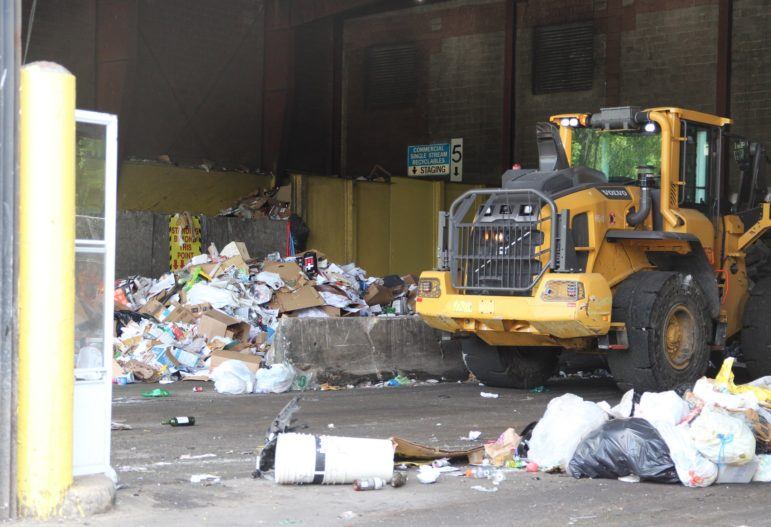At their March 4 meeting, the Board of Selectmen discussed the possibility of removing the sunset clause for the tipping fee ordinance impacting the town’s Holly Hill facility, where people bring trash, recycling, book swap, textile recycling, and food scrap recycling.
When Greenwich imposed a per ton tipping fee for haulers ($112 per ton), the town was no longer the only municipality in CT not to charge a tipping fee for commercial haulers. The ordinance was also passed with a $25 flat fee permit for residents to visit the site themselves.
The ordinance included a sunset clause for Oct 31, 2021.

On Thursday, DPW commissioner Amy Siebert said when the ordinance was passed with a sunset, it failed to align with DPW’s fiscal year.
“That creates a little bit of a hiccup for us,” she said.
“If we start selling new permits here very soon, people will say, ‘But the ordinance says I only need a permit until October,'” she said.
Back when tip fees were imposed, haulers complained, saying there was no incentive for residents to decrease the amount of trash they generated, and that they weren’t in a position to police residents who didn’t separate recycling from trash.
There were also complaints that the $25 fee for residents was too low, and that it failed to incentivize them to reduce the amount of garbage they generate.
Further, there are a number of residents who like to go to the dump just to visit the book swap, Goodwill, or deliver their food scraps, or yard waste because haulers don’t do that as part of their services.
The arrangement means residents paying the $25 flat fee aren’t paying commensurate with the amount of trash they generate.
The tipping fee ordinance was passed after a proposed pay-as-you-throw proposal postponed indefinitely in May 2020 (198 in favor and 17 opposed with five abstentions.) Pay-as-you-throw was controversial in large part because it was proposed to include a contract with a DEEP preferred vendor, WasteZero, and residents would be required to purchase special plastic bags for their trash.
Since tipping fees were imposed, a waste advisory committee has been formed that includes business people, haulers, and environmentalists. They’ve been considering ways for the system to be more equitable.
Camillo said considerations included tiered pricing for permits.
He said they were looking at options including a $25 fee just for recycling, and an additional $50 for trash, and $100 to also include bulky waste.
“The way it stands now, with just a $25 site access fee, it’s really just for free,” he said on WGCH on Friday. “Somebody who has a hauler is getting charged the tipping fee. The fee is being passed from the hauler to the customer.”
Siebert said another option might be to change the sunset deadline to align with the fiscal year.
She noted there might be more equity with a system that charged people for how much trash they bring in.
“Following the model of some other towns, where I live, when you come in, you’re asked how much trash do you have,” she said. “One to three bags is $5.00. Four to seven bags is $10, so you’re trying to put some equity in there.”
“The devil’s in the details of implementation,” she added.
Camillo said the discussion should dovetail with other efforts to divert MSW from the waste stream, including food scrap and textile recycling.
He has also advocated expanding the state’s bottle bill.
“I’ve already given my support to state leaders in supporting expansion of the bottle bill, which would incorporate more items,” he said on WGCH. “When you walk around, you don’t see many water bottles on the ground any more because people pick them up and they go get the deposits.”
Camillo said if there was a 5¢ or 10¢ fee on small liquor bottles, for example, they would also start to disappear from litter and be diverted from the waste stream.
The Selectmen did not vote on the sunset clause. The matter will be return to the their March 11 agenda. The RTM would need to approve the decision afterward.
RTM Votes to Implement Tipping Fees at Town Dump; Kills Pay As You Throw
May 12 2020